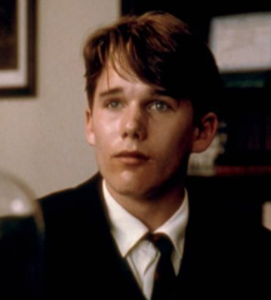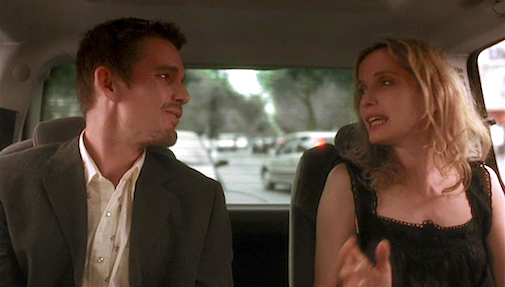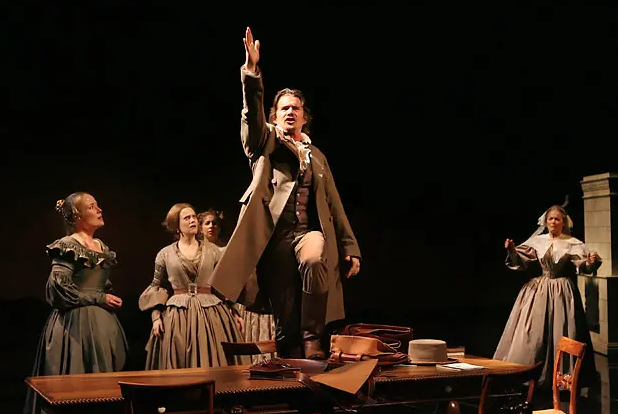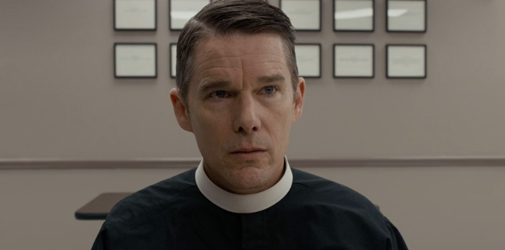by Lynn Lee

If I had to pick one actor who most perfectly embodies the spirit of Generation X, the choice would be a no-brainer. With all due respect to other 40 and 50something stars (Leo, Brad, Johnny, Keanu) or dead icons (River, Heath) in his peer group, it could never be anyone other than Ethan Hawke. Not because—or not only because—of Reality Bites, which made him the poster child for cynical, disaffected (but secretly vulnerable) Gen X slackers everywhere. Rather because his career exemplifies the quiet independence and under-the-radar achievements of that not-quite-lost, but certainly liminal, generation. He’s been working steadily since his debut, at the age of 14, in Explorers (1985), yet like any good Gen Xer, has successfully eluded easy characterization. He reaches the half century mark today having assembled one of the most intriguing and eclectic bodies of work of any currently living actor...
 Truth be told, I wasn’t always an Ethan Hawke fan. I first saw him in Dead Poets Society, where he didn’t make much of an impression on me despite being arguably the main character, surrounded as he was by more colorful and charismatic costars. Even in his brooding heartthrob years, adolescent me didn’t find him at all appealing (“He has a ferrety face and a nasal voice,” I told my friends who thought he was dreamy), and dismissed him as a poser artiste offscreen. I even passed on seeing Before Sunrise when it first came out, because it sounded like the epitome of everything I found annoying about him.
Truth be told, I wasn’t always an Ethan Hawke fan. I first saw him in Dead Poets Society, where he didn’t make much of an impression on me despite being arguably the main character, surrounded as he was by more colorful and charismatic costars. Even in his brooding heartthrob years, adolescent me didn’t find him at all appealing (“He has a ferrety face and a nasal voice,” I told my friends who thought he was dreamy), and dismissed him as a poser artiste offscreen. I even passed on seeing Before Sunrise when it first came out, because it sounded like the epitome of everything I found annoying about him.
Yet in college I found myself increasingly drawn to his movies and liking the ones I saw. Andrew Niccol’s Gattaca, Michael Almereyda’s Hamlet, even Alfonso Cuarón’s critically panned Great Expectations (which I still have a soft spot for), each piqued my interest with its premise and impressed me with its style and execution. Hawke’s acting, on the other hand, I found merely serviceable. “He’s smart about how he picks projects,” I grudgingly conceded.

My attitude finally shifted with Before Sunset, which I fell head over heels in love with even without having seen Before Sunrise. The experience prompted me to finally see the earlier film, which much to my surprise, I loved even more. Hawke of course had the perfect partner in Julie Delpy, and for that matter Richard Linklater, but none of the Before films would have worked without his full commitment to the character of Jesse—a natural romantic struggling to hold on to his ideals in the face of life’s hardening realities. (In real life, Hawke wasn’t able to hold on to his marriage to Uma Thurman, though it did produce two children, one of whom—Maya—is now a working actress herself who looks exactly like how you’d expect a child of her parents to look.)
Since then, his filmography has been as varied as it is prolific. He’s played cops (surprisingly frequently, due in large part to his collaboration with Antoine Fuqua), musicians of all stripes, a tortured cleric (more on that one in a moment), and most recently, a gonzo John Brown in the Showtime miniseries The Good Lord Bird. For every mainstream multiplex movie he’s made (Training Day, The Purge), he has an indie darling (Before the Devil Knows You’re Dead, Boyhood, First Reformed), a sci-fi oddity or cult favorite (Daybreakers, Predestination), and a teeny-tiny gem that only a handful of moviegoers even know about (Maudie; Seymour: An Introduction, one of my favorites from 2014) but is cherished dearly by those who do.
 Ethan Hawke in his Tony nominated role in "The Coast of Utopia"
Ethan Hawke in his Tony nominated role in "The Coast of Utopia"
That’s not even counting his theatrical work, which includes both a Tony nomination (for acting) and a Drama Desk nomination (for directing). He’s had as many misses as hits, both critically and commercially, yet for just about every project he’s been involved with, you can see what drew him to it. It’s clear he rarely, if ever, does any work just for the paycheck.
For all the diversity of his on-screen roles, Hawke isn’t really a chameleon, nor is he a movie star in the usual sense. He often plays an Everyman faced with a deep moral or ethical dilemma, and his gift as an actor is that he focuses the viewer’s attention on the dilemma rather than himself. By the same token, while he’s usually the lead or at least a lead, he just as often has an equal or even dominant co-lead, or happily blends into an ensemble (see, e.g., the recent Catherine Deneuve/Juliette Binoche vehicle The Truth).

The recent shining exception, of course, was his turn in First Reformed, which was probably just out of the running for a Best Actor Oscar nomination in a competitive year. Hawke’s searing performance as a pastor who takes on the spiritual despair of one parishioner, in addition to his own existing doubts, is the heart and soul of that film. Without an ounce of showboating, he powerfully evokes the intense pain of a man of faith driven to the brink by humanity’s cruelty to the planet and to each other. At the same time, he’s once again playing that Everyman who’s simply pondering the tough questions that all of us, at some point, may have to ask ourselves. In that respect, Hawke has long since proven that he’s an actor not just of his generation, but for all generations. May he continue to be smart about how he picks his projects.